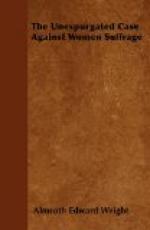Now if a woman insists, in the face of warnings that she had better not do so, on taxing man with dishonesty for withholding from her financial control over the revenues of the State, she has only herself to blame if she is told very bluntly that her claim to such control is barred by the fact that she is, as a citizen insolvent. The taxes paid by women would cover only a, very small proportion of the establishment charges of the State which would properly be assigned to them. It falls to man to make up that deficit.
And it is to be noted with respect to those women who pay their full pro rata contribution and who ask to be treated as a class apart from, and superior to, other women, that only a very small proportion of these have made their position for themselves.
Immeasurably the larger number are in a solvent position only because men have placed them there. All large fortunes and practically all the incomes which are furnished by investments are derived from man.
Nay; but the very revenues which the Woman Suffrage Societies devote to man’s vilification are to a preponderating extent derived from funds which he earned and gave over to woman.
In connexion with the financial position of woman as here stated, it will be well to consider first the rich woman’s claim to the vote.
We may seek light on the logical and moral aspects of this claim by considering here two parallel cases.
The position which is occupied by the peer under the English Constitution furnishes a very interesting parallel to the position of the woman who is here in question.
Time out of mind the Commons have viewed with the utmost jealousy any effort of the House of Lords to obtain co-partnership with them in the control of the finances of the State; and, in pursuance of that traditional policy, the peers have recently, after appeal to the country, been shorn of the last vestige of financial control. Now we may perhaps see, in this jealousy of a House of Lords, which represents inherited wealth, displayed by a House of Commons representing voters electing on a financial qualification, an unconscious groping after the moral principle that those citizens who are solvent by their own efforts, and only these, should control the finances of the State.
And if this analogy finds acceptance, it would not—even if there were nothing else than this against such proposals—be logically possible, after ousting the peers who are large tax-payers from all control over the finances of the State, to create a new class of voters out of the female representatives of unearned wealth.
The second parallel case which we have to consider presents a much simpler analogy. Consideration will show that the position occupied in the State by the woman who has inherited money is analogous to that occupied in a firm by a sleeping partner who stands in the shoes of a deceased working partner, and who has only a small amount of capital in the business. Now, if such a partner were to claim any financial control, and were to make trouble about paying his pro rata establishment charges, he would be very sharply called to order. And he would never dream of appealing to Justice by breaking windows, going to gaol, and undertaking a hunger strike.




